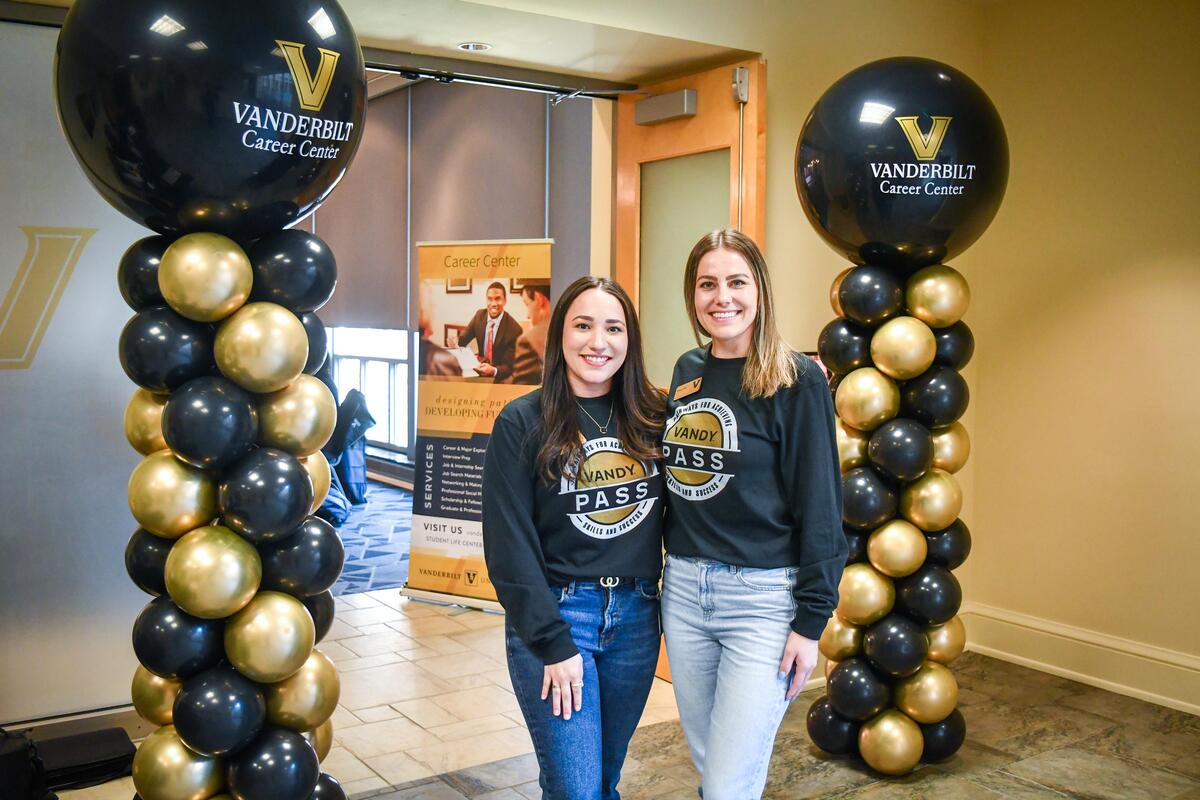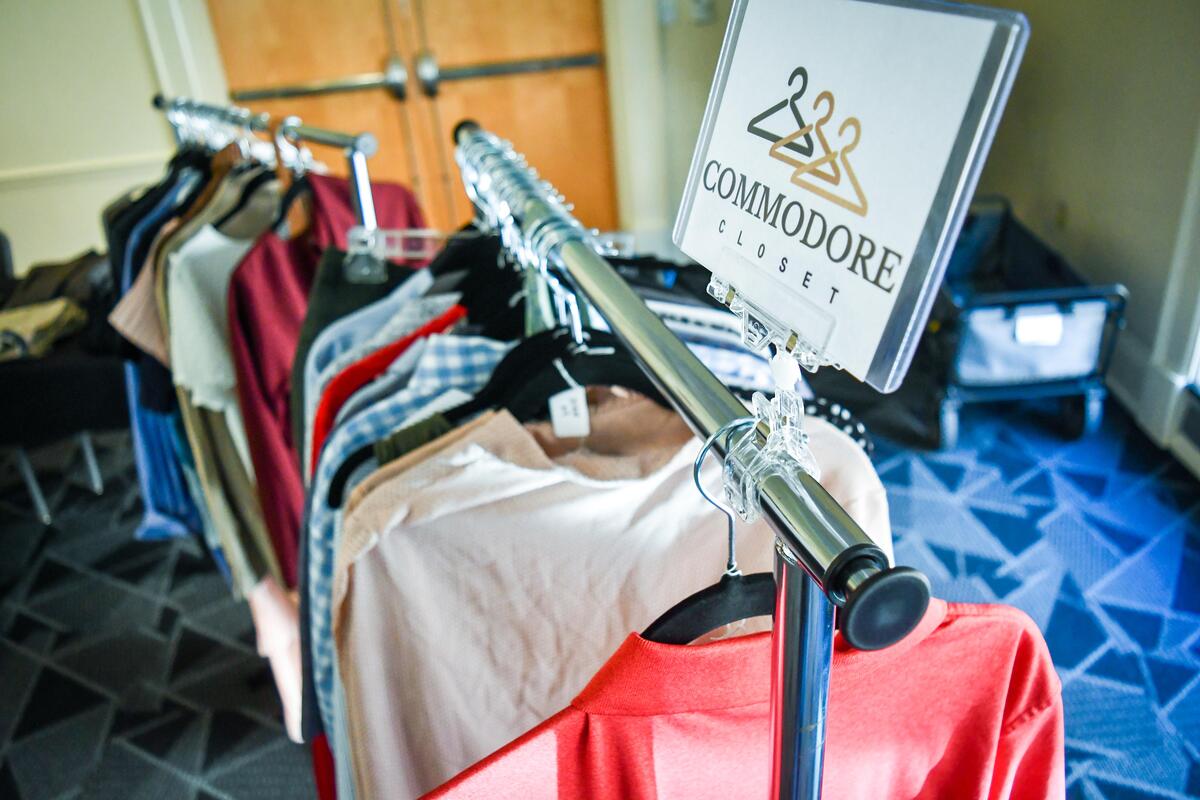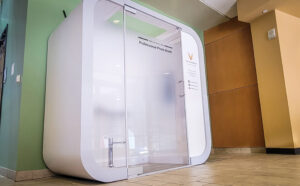Who We Are
The Career Center serves the following populations:
Undergraduate Students
We support undergraduate students enrolled full-time in Blair School of Music, College of Arts and Science, Peabody College, and School of Engineering.
Graduate Students
We support the academic and non-academic career and professional development of master’s and doctoral students in STEM, Humanities, and Social Sciences disciplines. We also support students in the Master of Legal Studies (MLS) and Engineering Management (M.Eng).
Doctoral students who are affiliated with VUMC or the School of Medicine are supported by The Office of Biomedical Research Education and Training (BRET).
Post Doctoral Fellows
We support the non-academic career exploration and planning of postdoctoral fellows in STEM, Humanities, and Social Sciences disciplines.
Postdoctoral fellows who are affiliated with VUMC or the School of Medicine are supported by The Office of Biomedical Research Education and Training (BRET).
Alumni
We are proud to support undergraduate and graduate alumni 0–2 years after graduation.
Additional Support
For graduate students and postdoctoral fellows, we support preparation for career-related opportunities outside of academia. Assistance preparing materials for the academic job market should be obtained from graduate students’ and fellows’ departments (academic advisors, PIs, mentors, and committee members).

Our Expertise
Visit the Career Center to Gain Clarity About:
- Handshake and numerous other online resources
- Networking
- Career & Major Exploration
- Graduate & Professional School Advising
- Interview Prep
- Job & Internship Search
- CVs, Resumes, & Cover Letters
- Professional Social Media & Online Portfolios
- Negotiations
- Scholarship & Fellowship Opportunities
Schedule a Coaching Appointment
Login to Handshake to schedule an appointment to discuss your specific goals and gain clarity from one of our career coaches.
Students and postdocs should visit our office during drop-in hours for resume & cover letter reviews.
Reserve an Interview Room
Perfect for virtual interviews and presentations, the Career Center is excited to offer interview rooms for students and scholars. Rooms are available on the following times:
- Monday: 8 a.m. to 4 p.m.
- Tuesday: 8 a.m. to 4 p.m.
- Wednesday: 8 a.m. to 9 a.m., 11 a.m. to 4 p.m.
- Thursday: 8 a.m. to 4 p.m.
- Friday: 8 a.m. to 3 p.m.
Big Interview
Big Interview is an AI-powered tool provided by the Vanderbilt Career Center to help Commodores excel in interviews. It offers 24/7 interactive interview prep, including:
- Mock interviews for all experience levels and industries
- Thousands of interview questions with tips
- The ability to rate and share your answers
Plus, with ResumeAI, you can receive instant feedback on your resume's readability, credibility, and ATS fit.
To register, visit Big Interview and log in with your Vanderbilt SSO. You can watch an overview of Big Interview here.
Note: The Vanderbilt Career Center recommends using ResumeAI to score your resume before coming in for drop-ins. ResumeAI is not a substitute for an in-person resume review; it's important to use your own judgment and discretion when incorporating AI advice into your interview preparation and resume creation. However, this resource can help you better understand what aspects of your resume may need attention and how to practice for an interview.
Handshake
Handshake is the Career Center’s online resource where you can learn about and connect to professional opportunities on and off-campus. You can search for internship and job opportunities in different industries, find Career Center events, and much more! Vanderbilt undergraduate and graduate students have access to Handshake. Alumni have access for up to four years after graduation.
Student Organization Support
Are you part of a student organization and you have an upcoming event that you need help with? Let’s talk about how we can make that possible. We look for intentional ways to support your student organization from presentations to sharing of professional resources to monetary support. Complete this form to get started.
Application Materials
Resumes & CVs
Resumes and CVs are an important aspect of a successful job search and will often determine whether you will receive a call for an interview.
A general resume can be submitted for any position but we recommend you arrange your information so it is targeted to a particular job or industry. Some industries prefer information presented in a specific format, so you should research the job, company, or industry before you begin writing your resume.
Once your resume or CV is complete, you can begin applying for internships and jobs. Before you can apply to any positions in Handshake, you will need to have a resume uploaded to the system.
To help you get started, here are examples and checklists:
Cover Letters
Cover letters should be customized for each position to which you are applying, using the job description and the information you have collected about the company as a guide for how to draft your letter.
Thank You Notes
A thank you note or email is an essential component of the interview process, whether for a job or internship, graduate school interview, or even an informational interview. This simple gesture can speak volumes about your interest and your appreciation for the opportunity to interview. As a job candidate, you should view the thank you note as yet another opportunity to show an interviewer what a great fit you would be with their organization or program.
The traditional thank you note takes the form of a handwritten letter, but the modern form is through email. If your handwriting is legible, then this gesture can add a touch of personalization to your correspondence. If your handwriting is poor, however, a typed letter is perfectly acceptable. Select neutral paper or note cards, such as white or cream, and avoid colored paper and cutesy graphics or greetings.
Ultimately, you may want to make your decision on what method to use based on how formally your interview was conducted. If your first impression felt strictly formal, then a typed letter may be more appropriate; if the atmosphere was more informal, a hand-written note or email may work better.
It is important to email a thank you note to the interviewer within 24 hours of the interview. Many applicant decisions or second-round interviews will be made quickly; emailing a thank you note will reaffirm your interest in the position.

Interviewing and Attire
An interview is simply an exchange of information between a candidate and someone who can make a hiring decision. While interviews are usually formal, you are interviewing any time you meet someone who can influence whether you advance in the search process.
Interviewing is typically one of the last stages of a job search; it is also one of the most important. All of the other steps of your search process lead up to the interview. This is where it all comes together – the opportunities you discovered, your research, resume and cover letter preparation, and your conversations with networking contacts.
Professional Photo Booth
 Professional headshots are a must-have for any LinkedIn account, but they can also be used in email signatures, presentations, and personal websites. The problem is finding the time, resources, and even the courage to get a professional headshot taken. That’s why the Career Center is proud to present our free, self-service photo booth. Just step inside, pose, and share!
Professional headshots are a must-have for any LinkedIn account, but they can also be used in email signatures, presentations, and personal websites. The problem is finding the time, resources, and even the courage to get a professional headshot taken. That’s why the Career Center is proud to present our free, self-service photo booth. Just step inside, pose, and share!
Located on the first floor of the Student Life Center (near the office of Global Safety), this resource is free and available to the entire Vanderbilt community. The photo booth is available for use anytime the Student Life Center is open. Check out this flyer for more details!
Here are some tips to keep in mind when using the photo booth:
- Dress appropriate to the position or industry you are pursuing, and style your hair, attire, and makeup as you would if you were meeting an employer for an interview.
- Make sure the camera is eye-level.
- Smile!
- Review the photos taken and select the best of the bunch to upload to LinkedIn or other social media profiles.
Networking
Networking is a critical component of an effective job search. From friends and alumni to potential employers there are many avenues available to grow your network. Many students are already networking, they just don’t know that’s what it is called! Check out all of our Networking Tips!
